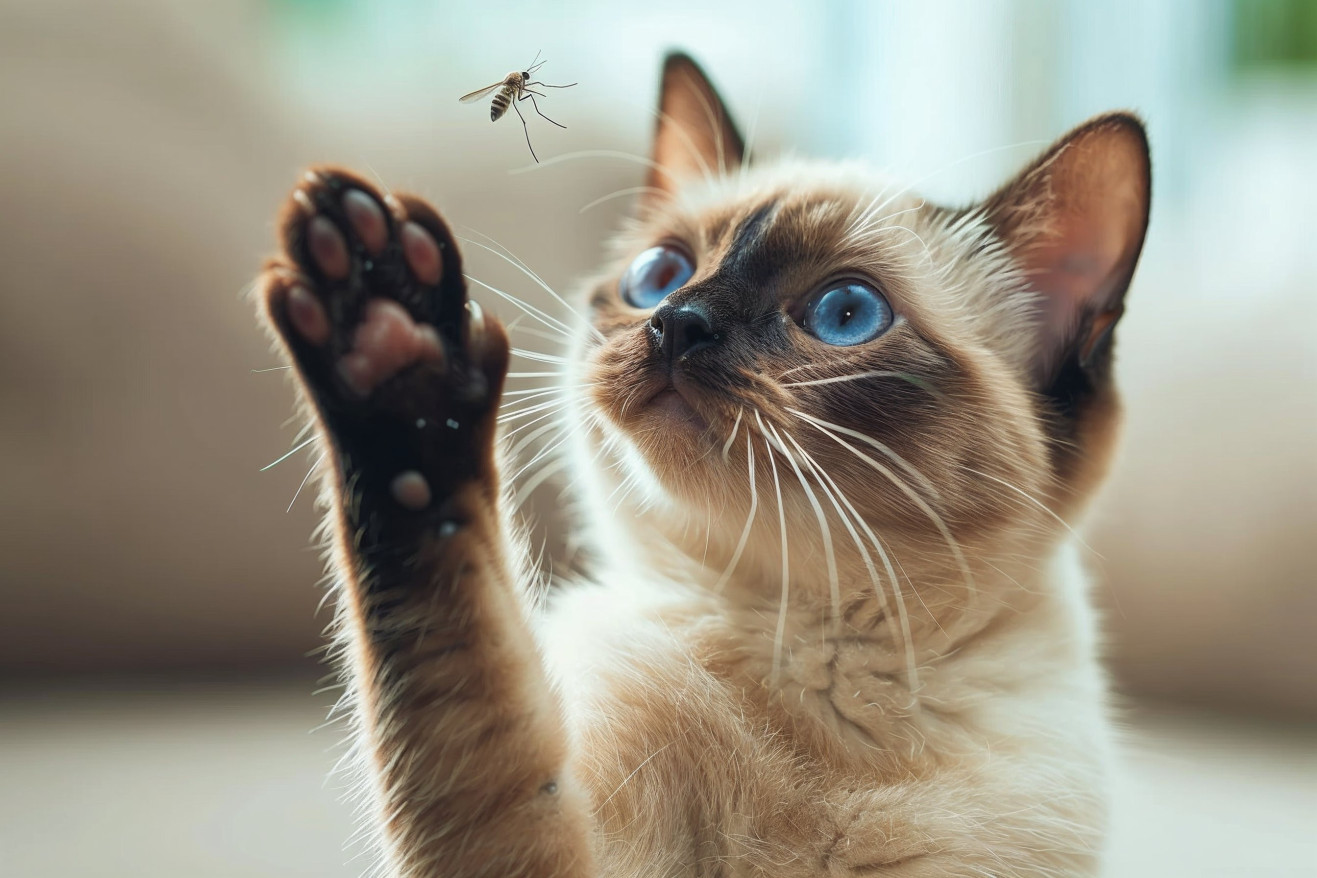Do Mosquitoes Bite Cats? Understanding the Risks
29 May 2024 • Updated 28 May 2024

If you’re a cat owner, you may be wondering if mosquitoes are a threat to your furry friend. The short answer is yes, mosquitoes can bite cats. Since cats are mammals, mosquitoes are just as likely to bite them as they are to bite humans. This means that both indoor and outdoor cats can be bitten by mosquitoes.
In this article, we’ll explore the scientific literature on the relationship between mosquitoes and cats, including why mosquitoes are attracted to cats. We’ll also discuss the health risks of mosquito bites for cats and how you can prevent your cat from being bitten. Whether you have an indoor or outdoor cat, it’s important to know the facts about mosquito bites so you can keep your pet safe.
Do mosquitoes bite cats?
Heartworm Disease in Cats
Heartworm disease is a serious and potentially fatal condition in cats caused by parasitic worms transmitted through mosquito bites. While dogs are more commonly affected, cats can also become infected with heartworms, leading to respiratory issues and lung inflammation.
Even immature heartworms can wreak havoc in a cat's body. As the American Heartworm Society explains, immature worms trigger a condition called heartworm associated respiratory disease (HARD) which causes severe respiratory distress, coughing, vomiting, and weight loss.
Tragically, there is no approved treatment for heartworm infections in cats. Cornell University notes that the powerful medications used to treat dogs are fatal to cats. Without a cure, prevention through mosquito control and preventative medication becomes absolutely crucial.
Early detection is also key, as Animal Hospital of Dauphin County states that there are often no obvious symptoms in the early stages. Managing the disease long-term with anti-inflammatory drugs and monitoring is the only option once a cat tests positive. Preventing new infections through monthly preventatives is critical to avoid life-threatening complications.
How to Avoid Mosquito Bites: Repellents and Environmental Control
Using veterinarian-recommended mosquito repellents and preventatives can help cats avoid mosquito bites and the potential diseases that come with them. The Animal Humane Society explains that many heartworm preventatives and flea/tick medications that are given to cats on a monthly basis include mosquito-repelling ingredients. However, it’s important to note that products that contain DEET, permethrin, and other chemicals should never be used on cats because they are toxic.
While natural repellents such as essential oils, citronella, and lemon eucalyptus oil may be safer for cats, they should be used with caution. As Adventure Cats explains, cats are especially sensitive to essential oils and they should only be used indirectly, such as on a collar or diffuser. Citronella is also toxic to pets, so it’s important to be careful when using citronella candles and oils.
Getting rid of standing water and controlling the environment around the home can help reduce the number of mosquitoes, as explained by The Kas Pack. One of the most effective ways to prevent mosquito bites is to keep cats indoors, especially during the times of day when mosquitoes are most active, such as dawn and dusk, according to Preventive Vet.
How to Recognize and Treat Mosquito Bites in Cats
Mosquito bites can cause local reactions in cats, including itching, swelling, and redness at the site of the bite, according to Just Cats Clinic. In some cases, cats may develop mosquito bite hypersensitivity, which can result in lesions, hair loss, and changes in skin color, according to Nicklin Way Veterinary Surgery.
Treatment for mosquito bites may include cold compresses, antihistamines, or topical ointments, depending on the severity of the reaction, notes Just Cats Clinic. It’s important to watch for signs of allergic reactions or infections and contact a vet if symptoms don’t improve, according to VCA Animal Hospitals.
Preventing mosquito bites by keeping cats indoors or using outdoor enclosures can help prevent bite reactions entirely, according to Nicklin Way Veterinary Surgery and Animal Allergy & Dermatology. With an awareness of the dangers and a willingness to take the right steps, cat owners can help their pets avoid the discomfort and potential health issues associated with mosquito bites.
More Mosquito-Borne Diseases That Impact Cats
While heartworm is the most common mosquito-borne disease that impacts cats, they can also be at risk for other diseases such as Eastern Equine Encephalitis (EEE) and West Nile Virus (WNV), according to the Maine Center for Disease Control and Prevention. While EEE and WNV are unlikely to impact cats, if they do, they can cause symptoms like fever, diarrhea, and seizures.
Because these diseases are more common in certain areas and at certain times of the year, it’s important to be aware of them and take steps to prevent them. This is especially true since, as the Olympic Peninsula Humane Society points out, there is no treatment approved by the FDA to treat adult heartworms in cats, which makes it especially important to focus on prevention through medication and mosquito control.
It’s important to talk to a vet about the risks in your area and make sure to follow their advice for preventing these diseases, according to VCA Animal Hospitals. Keeping the environment clean, using mosquito control, and limiting exposure to the outdoors can all help reduce the risk of mosquito-borne diseases in cats. By being proactive, cat owners can help make sure their cats are protected from these diseases, which while rare, can be serious.
Conclusion: How to Keep Your Cat Safe From Mosquito Bites
Preventing mosquito bites in cats is important, especially since mosquitoes can carry diseases like heartworm. Heartworm prevention products that are given to cats once a month are the best way to protect them from this dangerous disease. In addition, cat-safe picaridin-based repellents can be used to help keep cats safe from mosquitoes.
It's also important to note that DEET and permethrin are toxic to cats, so products that contain these ingredients should be avoided. Keeping cats indoors during peak mosquito hours can also help reduce their risk of being bitten.
It's best to talk to a vet to determine the best course of action for your cat based on their individual needs and the specific diseases that are common in your area. However, with the right care, cat owners can help ensure that their pets are safe from the dangers of mosquito bites.


